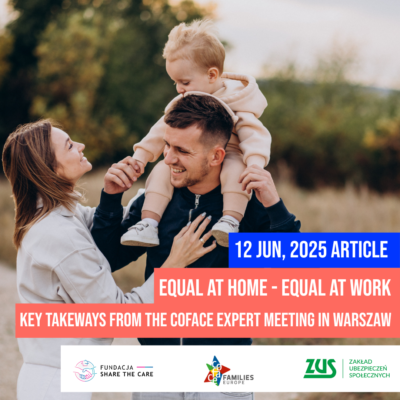How to effectively support parents in balancing family and work life? This was the key question during the European expert meeting in Warsaw on 21st May 2025, under the patronage of the Polish presidency of the EU and co-hosted with Share The Care Foundation Poland and ZUS (Social Insurance Insitution). We were honoured to have Magdalena Sobkowiak-Czarnecka (Undersecretary of State, European Union Affairs Division, The Chancellery of the Prime Minister) and Aleksandra Gajewska (Secretary of State, Ministry of Family, Labour and Social Policy) with us to represent the Polish government.
With 120+ participants from 27 countries (including our COFACE penguins who joined us given the big focus on parental equality), we had rich discussions focusing on challenges persisting for families of today across Europe and beyond, we discussed public policy solutions as well as good practices in the workplace. Both sides of the work-life balance coin.
Experts from family organisations and public policy-makers across Europe joined us in Warsaw, as well as employers, trade unions, health practitioners, representatives from key partners such as the OECD, EPSU, the UNFPA and the European Equality Law Network, and researchers from a wide range of universities in Poland and across Europe.
Some takeaways:
- In Poland, the recently published report of Share The Care and ZUS, presents data and summarises the effects of actions taken so far in Poland to create a modern and balanced ecosystem that supports parenthood and allows mothers and fathers to maintain work-life balance. This is also partly thanks to the EU work-life balance directive which has really helped to drive change and reform across EU countries to improve access to well-paid leaves and flexible work arrangements. EU law matters.
- But more can be done. The directive has not been fully transposed in all countries, and we are waiting for the report of the European Commission in August 2027 to take stock of the transposition. Meanwhile in neighbouring countries in accession negotiations with the EU, a lot remains to be done to reach the minimum standards of the directive. However, there is progress as demonstrated by the UNFPA new report on gender-responsive family policies in Eastern Europe and Central Asia, and the cost of not having these policies.
- There are many good practices in the workplace as seen from the examples of big companies present at the conference, as well as public policy initiatives (we explored the example of Austria) to create incentives for employers to be more family-supportive and father-inclusive. This ranged from flexible work arrangements to different supports for new parents and carers, both women and men. There was recognition that the voice of employers matters, not just as economic actors but as partners in shaping social progress. We expect employers to see family-friendliness and parental equality not as a burden but as a strategic advantage. Family-supportive policies can unlock Europe’s hidden talent pool, which is essential in this moment of rapid transformation with new threats around the corner such as the war in Ukraine. The European social partners were invited to adopt a formal position on family-supportive workplaces.
- The breakout sessions covered multiple topics including men and care, the partnership model of care and its impact on fertility, the return of mothers to the labour market after birth of a child, and using an inclusive approach in campaigns on parental equality which takes into account the diversity of families in European societies today.
- Childhood was very much in focus throughout the day, since work-life balance and parental equality are also about ensuring family teamwork for greater health and well-being of children. As well as childcare, care for adults was also discussed with intergenerational solidarity as central to the discussions.
- The professional care sector was spotlighted, highlighting the great potential of this sector for both social and economic benefits, however only if the working conditions and job quality of professional carers (including work-life balance measures) are reinforced urgently.
- COFACE does not advocate for pro-natalist policies, but we do support policies that remove the structural barriers that prevent people from having the number of children they want. Hence discussions on fertility were framed in this way, putting the focus rather on reproductive choice. OECD data presented at the conference highlight one recurring factor influencing people’s decisions to have a child or another child, and that is the difficulty of reconciling paid work with family responsibilities. Which points to the need for family policies which help achieve work-life balance. But beyond this, and in line with recent UNFPA reports, young people overwhelmingly report worries and uncertainty about their futures, with concerns about climate change, economic instability and rising global conflicts are reflected in the choices they make about raising families.
If you missed the conference, no worries! A meeting report will follow soon, and in the meantime check out the photos of the meeting here as well as the meeting video in English and Polish. Finally, you can view the recording of the plenary livestream here.
You can also follow post-meeting developments in Poland with the Share The Care campaign for fathers called Facet na 100 PRO!




